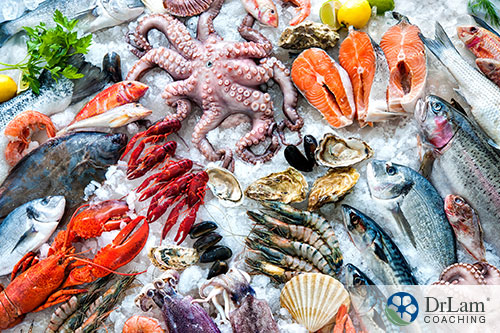 Eating a balanced and healthy diet is essential for your health and wellbeing. This can also sometimes mean taking in certain micronutrients that may actually be harmful for your body. Seafood contains a lot of healthy nutrients that can be difficult to get from other sources. However, along with the useful nutrients, there can also be mercury in seafood, which is one of the most toxic heavy metals in the environment. If you are trying to improve your health after experiencing Adrenal Fatigue Syndrome (AFS), or if you are particularly vulnerable to the damage this micronutrient can do, then here is what you need to know.
Eating a balanced and healthy diet is essential for your health and wellbeing. This can also sometimes mean taking in certain micronutrients that may actually be harmful for your body. Seafood contains a lot of healthy nutrients that can be difficult to get from other sources. However, along with the useful nutrients, there can also be mercury in seafood, which is one of the most toxic heavy metals in the environment. If you are trying to improve your health after experiencing Adrenal Fatigue Syndrome (AFS), or if you are particularly vulnerable to the damage this micronutrient can do, then here is what you need to know.
Mercury is a naturally occurring element found in rocks in the crust of the earth. It is also present abundantly in the air due to increasing levels of air pollution. Mercury is one of the most toxic heavy metals and a serious public health concern. Mercury can be found in three main forms, which are:
The mercury in seafood is a harmful organic form that occurs when mercury from the natural environment is transformed by bacteria and, it then accumulates in fish. This is the reason why many lakes in the US are closed to fishing because of mercury contamination.
Despite fish containing essential omega-3 fatty acids, proteins, and other valuable nutrients, they are also exposed to this toxic element when they consume the mercury in seafood. Fish and shellfish are a vital part of a healthy diet because they’re a good way of getting your daily intake of protein without the unhealthy fats that are usually present in red meat. In fact, the 2015-2020 Dietary Guidelines for Americans recommend that people eat two servings of seafood every week. This not only satisfies adult protein requirements; it also ensures a good intake of healthy fats. This however means that you are at risk of overexposure to the mercury in seafood.
Most people have blood mercury levels below 10 micrograms/liter and any amount under 20 micrograms/liter is considered normal. This concentration of mercury in the blood is not known to be harmful to our health.
Mercury can build up in your system over months or years and often takes time before you can see the effects of it. It can get into your system through oral ingestions, inhalation, or skin exposure, and the effects are highly individual. The mercury dose, exposure, frequency of exposure, and your overall health will all help determine how the mercury in seafood will affect you. Mercury poisoning can cause damage to your lungs, kidneys, brain, eyes, and heart. It may also have harmful effects on the digestive, immune, and nervous systems.
The symptoms of mercury poisoning will vary, but can include:
 Headaches.
Headaches. Mercury is particularly dangerous for infants, young children, pregnant women, and breast-feeding women. The mercury in seafood can cross the blood-brain barrier and the placenta. This means that it can affect fetal development, causing brain damage and mental retardation. It can also increase the toxic load in your body, which may cause or exacerbate AFS. That is why pregnant women have to be limit their intake of fish.
A small amount of stress can be good, even essential for the health of your body. But stress in the modern world is often chronic. It is caused by a poor diet, a sedentary lifestyle, relationships, work, and a combination of other factors. This chronic stress can build up until it results in damage. This damage usually starts in the adrenal glands. The adrenal glands are essential to your NeuroEndoMetabolic (NEM) stress response because they release cortisol, also known as the stress hormone. Cortisol is responsible for changes throughout the body that prepare you to respond to the cause of the stress. It’s a vital part of the NEM stress response, which also helps to protect your body from stress-related damage. But when you are stressed over a long period, this system can become overworked and the adrenal glands start to degrade.
AFS is caused by emotional, mental, or physical stress. Anything that may damage your body or prompt a negative reaction in your body will only worsen your condition. If you eat a lot of fish or shellfish, the mercury in seafood could become a serious problem for your already overwhelmed body. This means that your attempt to improve your diet and eliminate AFS symptoms could do harm to your body and cause further circuit imbalances.
One of the more serious issues that occurs when you have AFS is dysfunction in the detoxification circuit. This circuit is responsible for removing toxins and metabolites from the blood and tissues, rendering them harmless, and then expelling them. It consists of the immune system, liver, and the interstitium, or the fluid and pockets between cells, organs, and the skin. When this system is functioning correctly, harmful toxins like mercury in seafood are removed from the body automatically, therefore it resolves stress naturally.
But when you have AFS, you begin to experience all the symptoms because the processes of this system starts to break down. The liver, which turns harmful toxins like mercury in seafood and metabolites into harmless, inert particles which can be excreted, starts to struggle in this condition. This results in a build up of toxins in cells and tissues, including in the interstitium. Toxins get accumulated here, and in turn obstructs it normal intracellular functions. In fact, the interstitium can become so obstructed that cells no longer get the nutrients they need to survive and can become damaged or even die. The toxin build up also activates the immune system, resulting in chronic inflammation. These three systems are strongly interconnected. When the liver starts to fail, the other two systems becomes dysfunctional as well. As AFS progresses, these imbalances get progressively worse, influenced by each other and by malfunctions of the other circuits.
Most adults can ingest a small amount of mercury in seafood without suffering from negative effects. But when you have AFS, this may no longer be true because of your already fragile health. Stress, a poor diet, environmental toxins, and poor health causes an overload of toxins and metabolites in your system. With a gradual degradation of the detoxification circuit, the accumulation of toxins continues to rise and as a result, the body simply fails to function further. This means that the mercury in seafood may bring on or exacerbate AFS, adding more toxins to an already overloaded system and worsening your overall health. In order to reduce the symptoms of AFS, the key to recovery is to eliminate the causes of stress, not add more toxins like mercury in seafood. So, it is crucial to strike the right balance when you add fish in your diet, to ensure that it does not backfire and your body is affected by the mercury in seafood instead. It is therefore important to get expert help and advice before you make any changes to your diet and lifestyle that will impact your AFS.
The small amounts of mercury in seafood is not usually harmful for most adults. However, if your system is sensitive and overloaded because of AFS, you will probably need to be more careful. Try choosing low-mercury seafood where possible, which means choosing smaller fish that have shorter lifespans. Larger fish that live longer tend to accumulate more mercury and pose a greater health risk.
With that in mind, here are some guidelines for which seafood you should eat:
 Low Mercury Levels
Low Mercury LevelsSo, if you are adding more seafood to your diet to improve your AFS, try to choose items from the first two categories as often as possible. This will limit your intake of mercury in seafood. You can eat seafood with high mercury levels, but limit this as much as possible.
There are many health benefits to eating seafood, particularly if you have AFS and are trying to improve your overall health. These benefits outweigh the potential dangers of mercury in seafood. If you are particularly at risk from this micronutrient, then you should make smarter choices when you eat your recommended weekly servings of fish. By choosing fish that have low levels of mercury, you can enjoy the health benefits without dangerous side effects.
Mercury is a toxic micronutrient that can seriously impact your health if it is already fragile. That means, if you are eating fish or shellfish to increase your intake of protein and Omega-3 fatty acids, you are at risk of being exposed to excess mercury in seafood.
